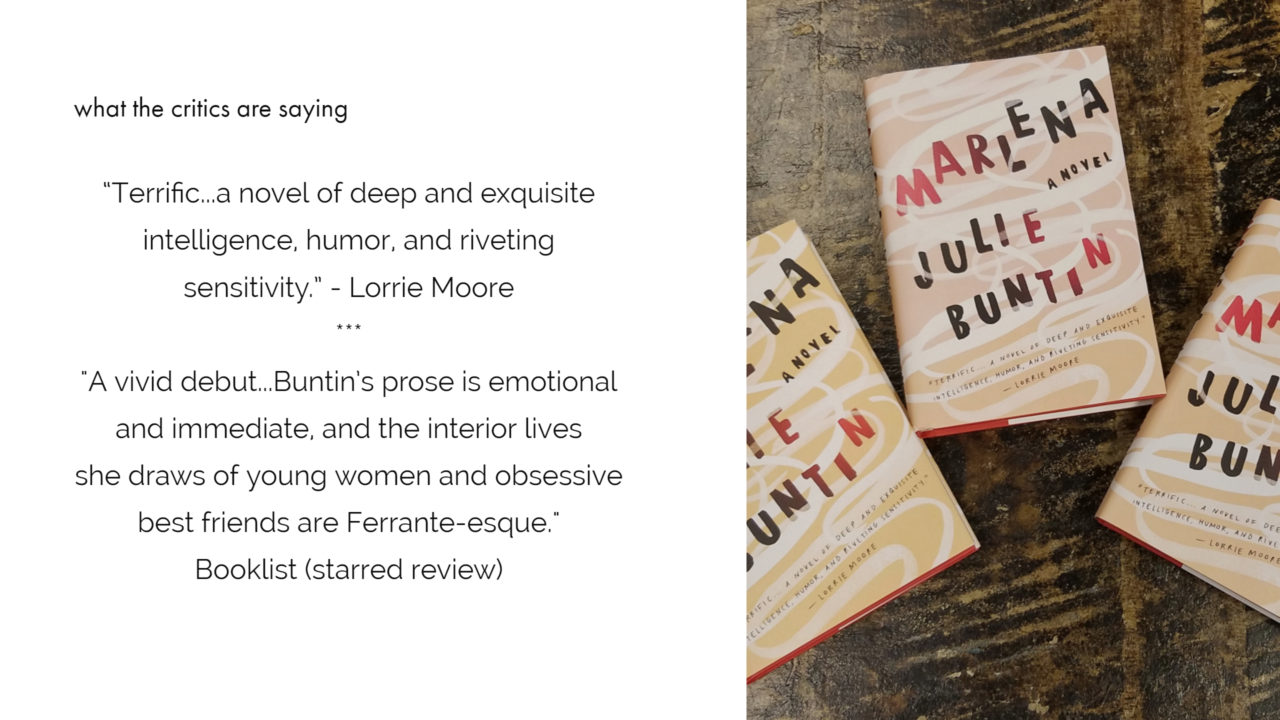
Julie Buntin (photo credit: Nina Subin)
We had the pleasure of reading MARLENA as our most recent virtual book club pick and the extra-special treat of meeting author Julie Buntin in person when she and husband Gabe Habash, author of Stephen Florida, came to Key West in March.
For everyone who didn’t get a chance to join the store event, we asked Julie a few questions that we hope will pique your interest in reading MARLENA.
Q: We know from the beginning of the book that Marlena will die, in fact has been dead for years, but there is such a sense of urgency and suspense that as a reader, I almost thought I could change things – like yelling at the screen during a horror movie – but Marlena dies and Cat survives, though profoundly affected by the both the loss and its unexplained nature. Do you consider the end of the novel hopeful?
Julie: I love this question – thank you for asking it, and I’m glad to hear that was your reaction. I wanted the reader to feel a little like that, as Cat does; this sense that maybe, somehow, the ending might be different. MARLENA is a book largely about grief and addiction, and it has two self-destructive women at its heart – I always knew I was writing a sad book, but even though it’s not overtly joyful or anything like that, I do think of the ending as hopeful. I see it as Cat taking ownership of this story – the act of telling it, facing it, is her way of moving on. That seems really hopeful to me.

Q: The book ends with some mysteries still unsolved. As the writer, how much of the character’s thoughts and knowledge do you know, but not present to the reader? For example, did you write knowing what Marlena’s final thoughts were?
Julie: Another great question. I don’t know what Marlena’s final thoughts were, though I do have an idea about what *really* happened to her, so to speak. But I didn’t want to solve the mystery, to explain her death for the reader – ultimately, this is Cat’s story, and the fact that no matter how she interrogates her memories, there’s still something about this loss that she will never understand seemed really essential to me in writing truthfully about how we experience grief. There are always elements of the story that remain unknown, that are lost with the person who is gone.
Q: When you were in Key West in March, you told us that the novel underwent a substantial revision after it had been acquired. Can you tell us about your revision process and what you had in mind as you shaped the published version?
Julie: Yes, I did a total overhaul. The draft that I sold to my publisher was a much longer book, more teenage stuff, and didn’t have as much from Cat’s adult perspective, though it was still told in her voice. After my editor gave me back her initial notes, she asked pages and pages of questions. As I reviewed her questions, I kept getting stuck on this other, larger question. Why is Cat telling this story now, so many years after Marlena’s death? That particular question was not the one my editor asked, but I felt if I could answer it (and my original draft definitely did not), then I could answer all of my editor’s more specific questions at the same time. I needed to give the story a motivating impulse, and in trying to figure out what that was, I had to look at who Cat had become as an adult. I found the answer to “why now?” both in Cat’s relationship to alcohol, and the surprise appearance of Sal.
Q: As you were writing and editing Marlena, what did your work as an editor give to the process and what did it take away from your work as a writer?
Julie: No one has ever asked me this before, and I am happy to answer, because I think editing other people’s work taught me how to revise my own. In my professional life, I think deeply about plot, about language/style, about how to help my writers understand their own blind spots while maintaining their voice and vision. I started working on book length editorial projects at exactly the same time I was revising MARLENA. I tried to apply the same editorial rigor that I bring to the office to my own work. Suddenly I could see that I needed a trigger for the story. MARLENA’s no thriller, and I never intended it to be, but I did want to develop a gradual kind of suspense – working as an editor, which often involves marking the beats of a story, trying to help the writer get the pacing right, taught me how to do that in my work. The downfall is that it makes writing harder. It’s harder for me to disappear into the act of making something, because the critical brain is always turned on.
Q: What was the most surprising part of having your novel published and going out on tour? What advice would you give other writers, about writing, getting published, continuing to write, etc.?
Julie: Meeting people who have read my book! It’s been out for a year, and I still cannot believe that it’s a real book, that people have spent time with it, that it’s on bookshelves. That will never stop being a dream and an honor. My only writing advice is to write, and not to be afraid of what you have to say – to let go of what other people think. As for getting published, I’ve worked in independent publishing for six years, and I still feel like I have very little practical advice – be yourself, I suppose, which is a little like my writing advice? As an editor, I’m always looking for something distinct, a character I’ve never read before, some idiosyncrasy to the way a writer puts their sentences together.
Q: We’re all hoping you’ll write another novel for us to devour. Can you say anything about your current writing projects?
Julie: I am taking notes for a nonfiction project about money, which is all I’ll really say about that. I am also in the early early stages of a novel that’s set at a boarding school, and follows a teacher, as well as a couple of students.
Q: What are you reading right now that you’d recommend?
I recently discovered the English novelist Anita Brookner, who is famous for HOTEL DU LAC, which I liked, but not as much as I LOVED some her other novels – BRIEF LIVES (fierce, mean, funny, whip-smart) and A MISALLIANCE (sneaky, so crisply written you don’t notice until it’s too late that it’s devastating). Next on my list is OFTEN I AM HAPPY, by Jens Christian Grøndahl.
~Robin Wood, Associate Manager
